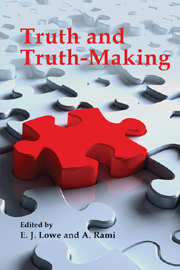Book contents
- Frontmatter
- Contents
- Preface
- Contributors
- 1 Introduction: truth and truth-making
- Part I Setting the stage
- Part II The current debate
- 8 Truth-making and correspondence
- 9 Facts and relations: the matter of ontology and of truth-making
- 10 Being and truth
- 11 An essentialist approach to truth-making
- 12 Are there irreducibly relational facts?
- 13 Why truth-makers
- 14 Postscript to “Why truth-makers”
- Bibliography
- Index
10 - Being and truth
from Part II - The current debate
- Frontmatter
- Contents
- Preface
- Contributors
- 1 Introduction: truth and truth-making
- Part I Setting the stage
- Part II The current debate
- 8 Truth-making and correspondence
- 9 Facts and relations: the matter of ontology and of truth-making
- 10 Being and truth
- 11 An essentialist approach to truth-making
- 12 Are there irreducibly relational facts?
- 13 Why truth-makers
- 14 Postscript to “Why truth-makers”
- Bibliography
- Index
Summary
Introduction
Our belief that Mars is red is true, owing (one might think) to the existence of a certain bit of reality, namely, Mars's being red. In other words, the belief is made true by something like a fact. And presumably we can generalize: presumably any belief, any statement, and any proposition, if true, is made true by the presence, somewhere in the universe, of the appropriate things, or events, or states of affairs, or facts.
Such tempting thoughts are the beginnings of a branch of metaphysics known as truth-maker theory, whose primary aim is to work out, for each of the many kinds of proposition that we believe and assert, which entities would have to exist for such propositions to be true. What makes it true, for example, that either Mars is red or pigs can fly? Is it best to answer by postulating the existence of the complex fact that either Mars is red or pigs can fly, or should we invoke Ockham's razor and make do with Mars's being red? And what sorts of truth-makers are needed for negative propositions (e.g. that Mars is not inhabited), for general propositions (e.g. that every planet has an elliptical orbit), for conditionals (e.g. that if Mars did have inhabitants we would be able to detect them), and so on?
- Type
- Chapter
- Information
- Truth and Truth-Making , pp. 185 - 200Publisher: Acumen PublishingPrint publication year: 2008
- 1
- Cited by



